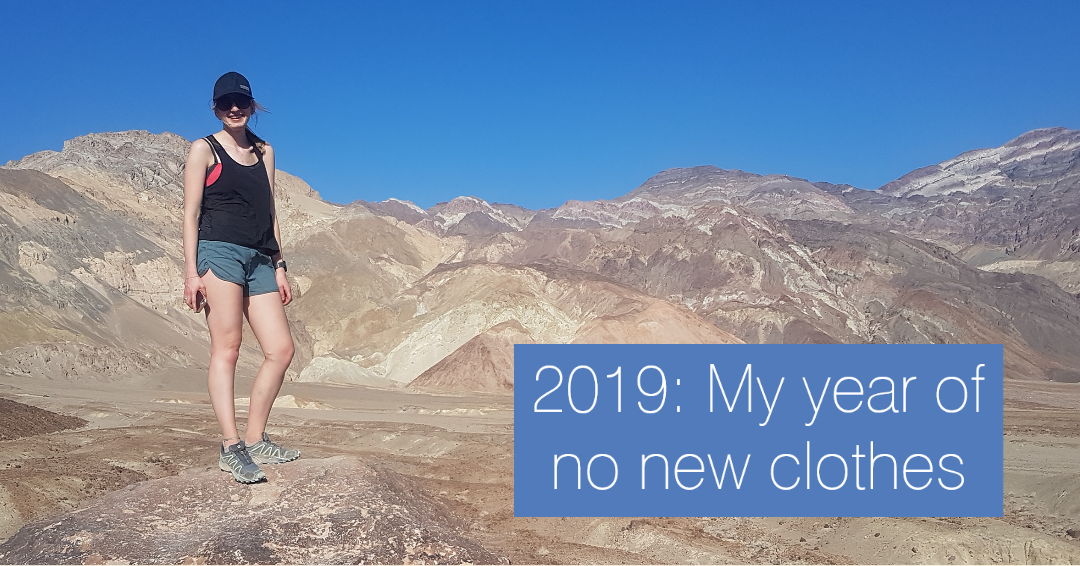2019: My year of no new clothes

The fashion industry is the world’s second-biggest source of pollution. We hear from the Business Development Analyst for Circular Economy at Edinburgh Innovations, Lucy Stanfield, on why her 2019 New Year’s Resolution was to buy no new clothes.
I don’t usually set traditional New Year resolutions. I tend to be an all or nothing kind of person, and not very good at small behaviour changes. So rather than saying that I’ll do something a little more or a little less of something, I set myself “big challenges” to achieve over the course of the year. Once, it was to run 1000 miles. Another time I wasn’t allowed to have any processed sugar (that was very hard).
So, at the end of 2018 I set myself a target for the following year: no new clothes.
Some people’s reaction when I said this was ‘so what? I can’t remember the last time I bought new clothes’ and I am very aware that having the disposable income to go shopping is an incredible luxury. But I came to realise that, for me, this was the area of my life where I was having the biggest, and most negative, environmental and social impact. I’ve been vegetarian since I was 10 years old, vegan for the last 3 years; I cycle everywhere, rarely fly; my partner and I produce so little waste at home that we only empty the bin every few months. However, despite all my environmental “credentials”, it was increasingly hard to ignore the impact of buying new clothes.
We live in a globally connected world with incredibly complex supply chains. The cotton dress hanging in my wardrobe was made from the natural and human resources of 4 different countries[1]. The £29.99 I paid for it vastly undervalues those resources. As I began to learn more about the truth behind who makes our clothes, I realised my shopping habit had to stop.

Another one of Lucy’s second-hand finds.
So, roll on 2019, and no more new clothes for me. I decided that I would allow myself to buy second-hand clothes, for example from charity shops or Depop, but found that I didn’t end up doing this much.
It was really so much easier than I thought. The most obvious method was also the most effective: just avoid shops. That sounds simple, but it’s amazing how they can suck you in, with attractive displays, lighting, music, even scent, all subtly (or not so subtly) trying to send you the message: your life will be better if you buy this thing. But remove that temptation and I found that all thoughts of buying new things were forgotten.
An unexpected upside was that I found I started to enjoy my existing wardrobe more. I rediscovered old clothes I’d half-forgotten about and pulled together new outfits. Being forced to be creative, rather than being distracted by a shiny new thing, made me more appreciative of what I already had.
On the occasions when I did allow myself to buy second-hand I got a handful of amazing items from local charity shops and the app Depop – it’s incredible what people get rid of! Targeting charity shops in particular neighbourhoods, for example, Stockbridge turned up some great stuff.

A second-hand dress Lucy got on Depop
Now it’s 2020 and although I have lifted my self-imposed ban on new clothes, I find it really hard to look at fashion and shopping in the same way. I can’t look at a cute dress or jumper without wondering about where it has come from; where were the materials sourced, and by whom? How did they get shipped, whose hands stitched it all together? What am I unconsciously supporting when I buy this?
I will, and have, bought new clothes again. But I’m focusing on quality items which have been made in a fair and sustainable way, by companies who care about having a positive impact, and which will last a long time. As with most things when it comes to sustainability, it’s all about moderation and making conscious decisions about what you really “need”.
If you want to learn more about sustainable fashion, I really recommend the online course Who Made My Clothes from the University of Exeter and FutureLearn: https://www.futurelearn.com/courses/who-made-my-clothes





Recent comments